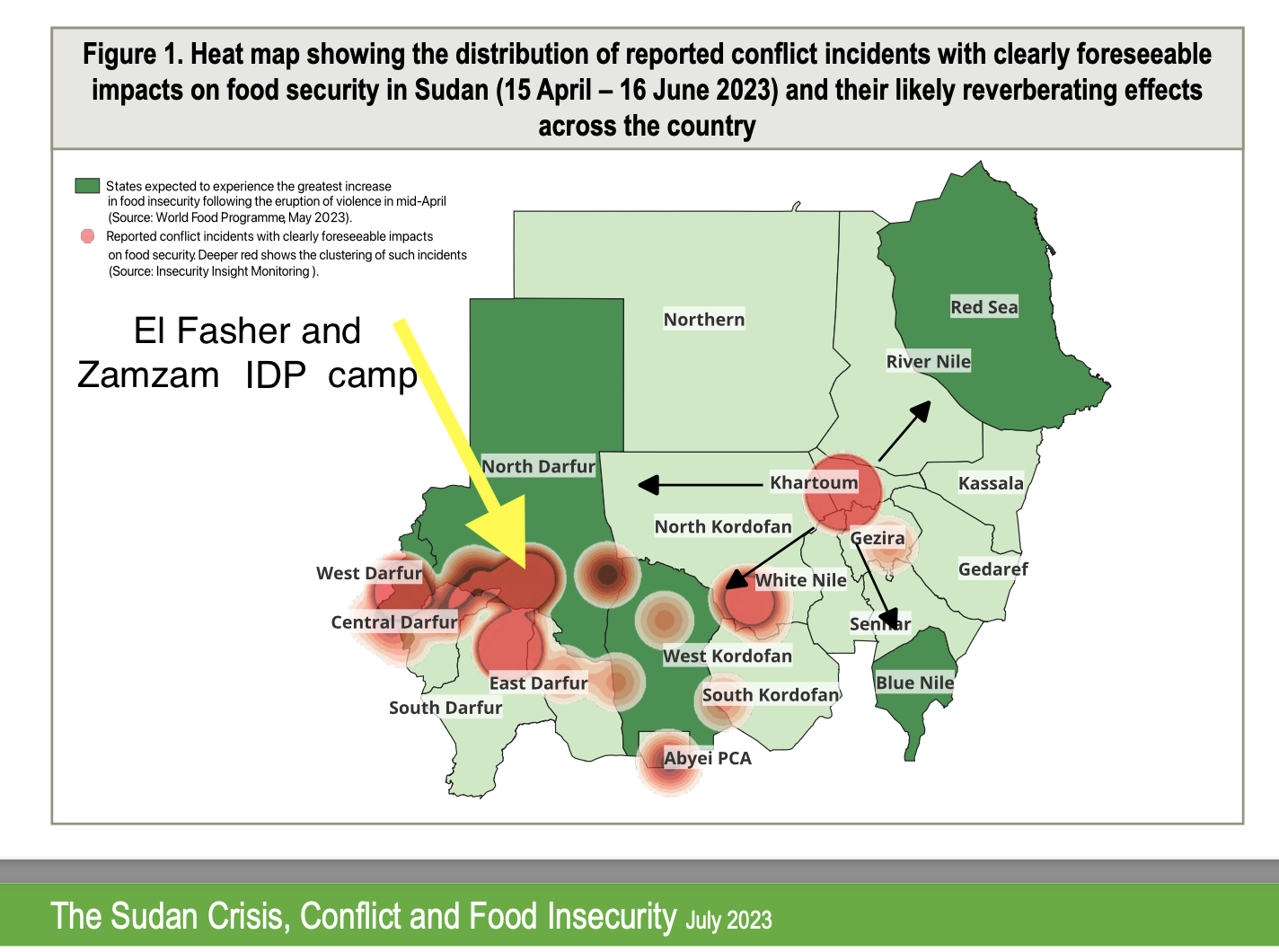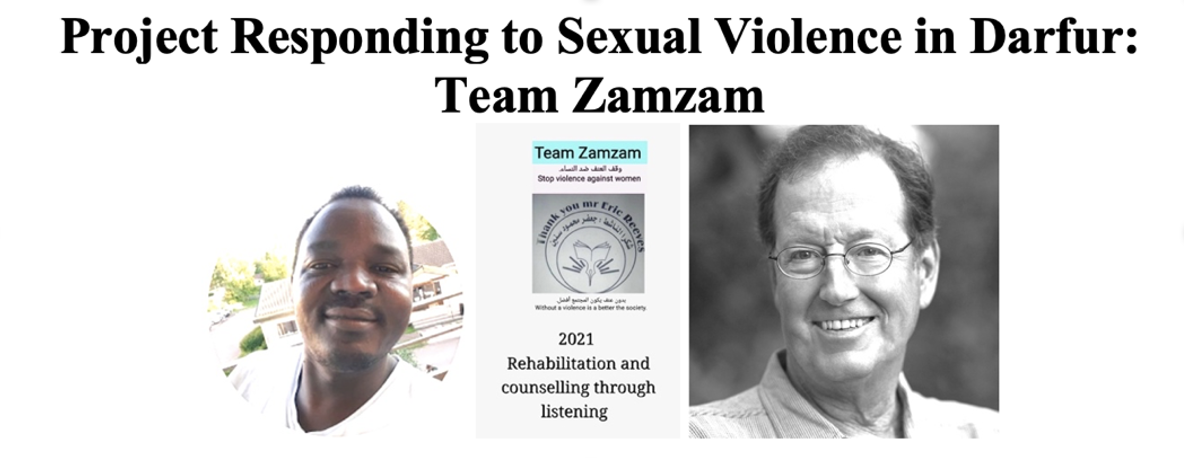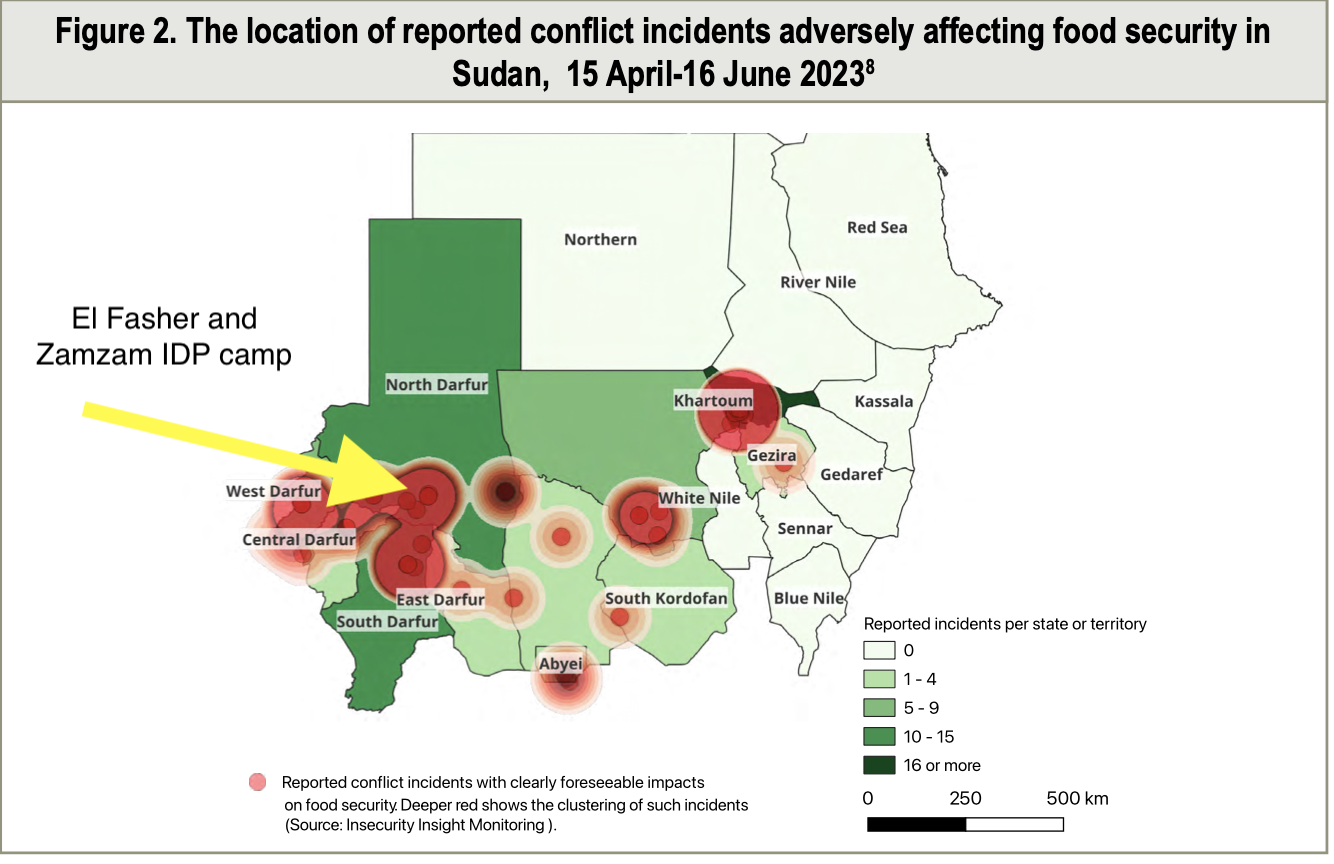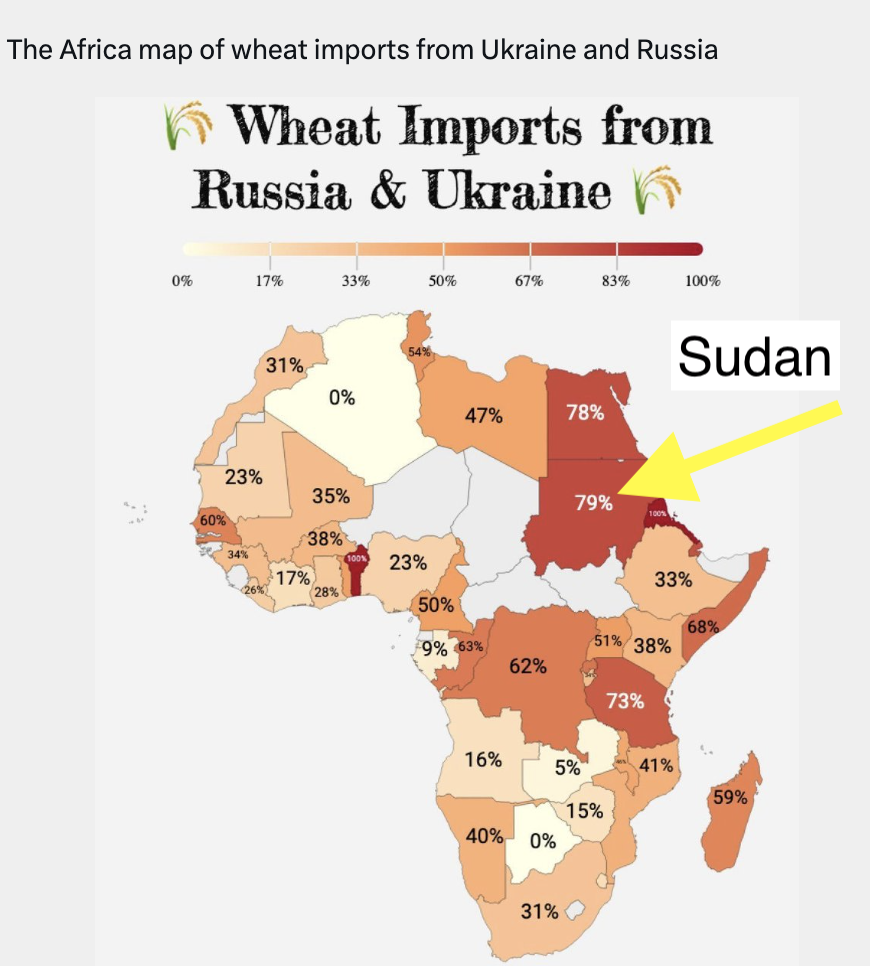Gaffar Mohammud Saeneen and Eric Reeves, Co-Chairs
Nancy Reeves, Editor and Funding Advisor; Julie Darcq, Online Campaign Coordinator
Overview (Eric)
[I.] In line with the wishes of the counselors who are the heart of our project—“Team Zamzam”—I begin this update with deepest thanks for the many people who have made possible our growth, the increase in food and medical supplies, and of course the monthly budget that makes this possible. I cannot readily convey how much happiness and joy accompany the many messages of thanks I have received from the counselors (by way of Gaffar’s translations).
At this point, as we begin the fourth year of our project, humanitarian aid is more necessary than ever: violence, including rampant sexual violence, is increasing in Darfur; and that violence has again prevented any substantial agricultural activity in most of Darfur, and including all of North Darfur; and the more general violence in Sudan prevents humanitarian organizations from providing critically needed assistance.
The counselors are beginning to use the additional funds recently received from a very generous donor to increase the supplies of food and medicine obtained locally (i.e., in El Fasher). But because of acute shortages of both, prices are skyrocketing at a terrible rate, and even hard currency is unable to keep pace. Much of North Darfur was already experiencing extreme food insecurity, with terrifying rates of Severe Acute Malnutrition (SAM) and global acute malnutrition (GAM) in children under five. Many have already succumbed to the effects of such malnutrition—and famine in areas has become increasingly likely.
While maintaining our original commitment to assist the girls and women who suffer from the consequences of 20 years of sustained, ethnically-targeted sexual violence, it has come to seem imperative that our project do what it can to assist those most desperately in need of food and medicine within the camp. As I have often noted, Team Zamzam is constantly conducting assessments in all four districts of this immense area (there are in the neighborhood of 450,000 displaced persons in the camp). They note where the most needy are located: orphans, the disabled, the very elderly, and mothers who are caring for multiple children (some not their own).
[II.] The rapid acceleration of violence in Darfur derives from the unspeakable violence in Khartoum, which pits the regular army forces (the Sudan Armed Forces, SAF) again the Rapid Support Forces (RSF) militia led by Mohamed Hamdan Dagalo (better known as “Hemedti”). Conflict in the greater Khartoum urban area has been sustained, fantastically destructive, and marked by numerous war crimes on both sides. But it is the Rapid Support Forces that have distinguished themselves in the barbarism with which they operate. Children are shot for no reason; hospitals have been seized as barracks, with all patients—even newborns and the critically ill—forced out into the streets. Attacks on medical personnel have been constant. Countless homes have been looted and occupied.
From this barbarism and cruelty derives a basic fact: the RSF—already hated by the people of Khartoum and riverine Sudan—are now hated even more passionately, and no military “victory” can change this—or make of Hemedti a viable political figure. Although it is difficult to know how long conflict in the Khartoum urban area will continue, there is strong evidence that a great many RSF forces have already left the city, moving westward, mainly to Darfur. They carry with them their loot, but have no political or ideological commitments—other than to acquire land and to continue their looting. Kutum in North Darfur is one gathering point: the town, roughly 50 miles northwest of El Fasher and Zamzam, the town and one relatively small IDP camp outside Kutum (Kassab camp) have been emptied.
“Secret” talks between the RSF and SAF in Jeddah (Saudi Arabia) have produced no breakthrough, although one highly informed source has indicated to me that the negotiations are over the terms on which the RSF will withdraw from Khartoum, military success effectively denied them, in part because of the brutality and terrorism that have defined their fighting against the city’s population. The RSF has strong regional support—notably from Mohamed bin Zayed, head of the United Arab Emirates, and General Khalifa Haftar, who controls southeast Libya. But Chad and its leadership have firmly rejected any alliance with the RSF, and this leaves only Darfur as an area to which they may safely withdraw.
One possible scenario is that the RSF extract from the SAF the “right” to control Darfur, politically and economically (including the exceedingly important Jebel Amir gold mining complex in North Darfur). It was Khartoum’s neglect of Darfur, and the political favoritism of Arab tribes—including armed militias—that was one of the precipitating causes of the rebellion that began 2002/2003. There may well be a sentiment among the SAF—the leadership of which comprises primarily riverine Arab groups—to “let Darfur go.” The violence that will ensue in Darfur is unimaginable, although I have in this month’s ANNEX(a) attempted to offer a compendium illustrating the immensely cruel RSF violence that has already been reported in El Geneina (capital of West Darfur) and other regions of Darfur, as well as in Khartoum. (A second ANNEX(b) provides a more detailed account of the security situation and humanitian conditions in El Fasher and Zamzam IDP camp.)
[III.] The current humanitarian situation has only further deteriorated since last month’s Update. The maps below highlight the most affected areas and Zamzam is in the very center of the most affected:
Notable as well are the increasing effects of Russia’s blocking of Ukraine’s grain exports: 80% of Sudan’s wheat imports have been from Ukraine and Russia. The shutdown of Ukrainian exports will soon be felt, indeed is already being felt throughout Sudan.
Medical supplies and care have also shrunk dramatically, although our project is still able to fund fistula surgery for three girls and/or women per month. The agony these girls and women is simply indescribable: their physical pain from constant infections and the terrible social stigmatization leave them rocked with despair, often with suicidal ideation (or indeed act). In responding to their needs, the counselors of Team Zamzam have used their now very considerable experience as both psychosocial workers and have created a dedicated cohort of counselors to provide pre- and post-operative care for these most neglected of victims.
[IV.] Because of continuing difficulties of communication, I am able to offer only this skeletal account of the activities of Team Zamzam for the period June 21 – July 21. The period between July 21 and August 1 will see distribution of the first of our much-augmented supply of food and medicine deriving from recent contributions.
I would note in passing that our Project in Zamzam was highlighted by a dispatch from Radio Dabanga, the most authoritative and comprehensive news source for Darfur.
******************
This is the work carried out during the period from June [21] to July [21] 2023 in Zamzam (from the coordinating counselor of Team Zamzam)
38 routine visits to inspect the living conditions of the newly displaced who still suffer severely from an acute shortage of basic necessities in the camp. During these visits, we noticed a continuous deterioration in the living and health conditions, due to the high prices of foodstuffs, scarcity of commodities and the inability to purchase for many families.
76 patients suffering of illness have been to different hospitals in the city for medical treatment and counseling
Counselling sessions for victims of sexual violence:
Total sessions:
113 individual sessions
58 group counseling sessions
Urinary fistula patients
Number of patients who received medical treatment: July: 3 patients (including pre- and post-operative care)
Distribution of basic necessities
With the continuation of the fighting in Sudan, which has now entered its fourth month, food shortages have increased in a frightening way, causing people to live in a state of daily confusion about how they will gather the goods they need. And panic has followed as prices have risen precipitously by 100% and continue to rise.
The most consumed basic necessities for people in Sudan, especially in Darfur, are: millet, flour, lentils, cooking oil, sugar and pasta; the prices for these have risen terrifyingly. Today, more than 95% of the residents of Zamzam camp, like other displaced people throughout Darfur, are suffering from severe shortages and an inability to purchase basic necessities, some of which was previously cultivated on the outskirts of their camp.
But today, the people of Zamzam have become trapped between the guns of the Janjaweed and the grinding existence that comes with the ongoing war of attrition. Here in Zamzam camp, like many other camps in Darfur and its main cities, everyone suffers from food shortages, high prices, an inability to access or to buy food. Despite this severe hunger, daily actions and violence of the Rapid Support Forces and its affiliated militia threaten life and livelihoods.
These are the exceptional and difficult living conditions in which most of the residents of Zamzam camp live. We feel morally obliged to address many of our energies and resources to alleviating the current suffering from hunger; therefore we purchased millet, lentils and sugar to distribute to the most vulnerable groups who are in dire needs.
The following basic necessities were purchased:
8 bags of millet (1 bag contains between 80 and 85kg)
6 bags of sugar (50 kg per bag)
18 bags of red lentil (5kg per bag)
Total beneficiaries:
369 persons
94 families
Medicines and medical supplies:
44 packets of painkillers for malaria and fever relief
Beneficiaries
22 families
[In the coming months, recent generous donations will permit a doubling of this food and medical assistance; clearly, such assistance could not be more timely, given the extreme inflation in food prices, which in turn severely limits what Team Zamzam is able to purchase—ER]
Other essential necessities for sheltering:
22 waterproof tents
14 blankets
Beneficiaries
11 families
How to Help
Assistance is urgently needed and will be greatly appreciated by Team Zamzam, and by the girls and women whose suffering they seek to alleviate. Increasingly importantly, the distribution of food and medicine presently is all that assists many within the camp who are daily moving closer to starvation (see above). Here I should also stress the tremendous efficiencies of purchases by a staff with local knowledge, as well as the value of their deep understanding of where need is greatest within this vast camp, swollen with recent displacements caused by insecurity.
NB: It is now possible to make a tax-deductible contribution to our project, using a portal on the website of a 501/c/3 organization operating in Sudan. Operation Broken Silence, working primarily on health and education issues in the Nuba Mountains of South Kordofan, has created a special site for a tax-deductible contributions to our project, and we hope this makes contributing to the health and well-being of girls and women in Zamzam easier for Donors.
We also hope that all will keep in mind our project as a whole operates with truly extraordinary efficiency, in ways matched by no humanitarian organization operating in Darfur that I am aware of, a region I have been researching for two decades. There is absolutely no overhead for this project.
Those wishing to assist in funding the work of Team Zamzam may also send a check directly to Eric (Eric Reeves, 31 Franklin St., Northampton, MA 01060)
or
Purchase one of his woodturnings: https://www.ericreeves-woodturner.com/gallery
100% of the purchase price of every woodturning directly supports the project in Zamzam.
*******************
Previous updates are archived at: https://www.ericreeves-woodturner.com/blog/
A “You Tube” video of Eric describing the project can be found at: https://youtu.be/QsRUa7GoVgY



